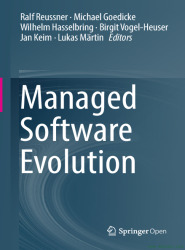Managed Software Evolution
Accordingly, the book is split into three major parts, the first of which includes an introduction to the nature of software evolution, followed by an overview of the specific challenges and a general introduction to the case studies used in the project. The second part of the book consists of the main chapters on knowledge carrying software, and cover tacit knowledge in software evolution, continuous design decision support, model-based round-trip engineering for software product lines, performance analysis strategies, maintaining security in software evolution, learning from evolution for evolution, and formal verification of evolutionary changes. In turn, the last part of the book presents key findings and spin-offs. The individual chapters there describe various case studies, along with their benefits, deliverables and the respective lessons learned. An overview of future research topics rounds out the coverage.
The book was mainly written for scientific researchers and advanced professionals with an academic background. They will benefit from its comprehensive treatment of various topics related to problems that are now gaining in importance, given the higher costs for maintenance and evolution in comparison to the initial development, and the fact that today, most software is not developed from scratch, but as part of a continuum of former and future releases.
Table of contents
| Pages : | 439 |
| Size : | 13.4 MB |
| File type : | |
| Downloads: | 73 |
| Created: | 2022-02-03 |
| License: | CC BY |
| Author(s): | Ralf Reussner, Michael Goedicke, Wilhelm Hasselbring, Birgit Vogel-Heuser, Jan Keim, Lukas Märtin |

Warning: Trying to access array offset on false in /home/tutovnfz/public_html/article.php on line 233
Others Computer science Tutorials
Operating Systems and Middleware
Others related eBooks about Managed Software Evolution
Jenkins: The Definitive Guide: Continuous Integration for the MassesThis book teaches you how to automate your build, integration, release and deployment process with Jenkins, the popular Java-based open source tool that has revolutionized the way teams think about continuous integration (CI). This concise guide shows you how to seamlessly include Jenkins in the d...
Composing Software: An Exploration of Functional Programming and Object Composition in JavaScriptAll software design is composition: the act of breaking complex problems down into smaller problems and composing those solutions. Most developers have a limited understanding of compositional techniques. It's time for that to change....
Intel Galileo and Intel Galileo Gen 2Intel Galileo and Intel Galileo Gen 2: API Features and Arduino Projects for Linux Program..., download free Intel Galileo tutorial in PDF (680 pages) created by Manoel Carlos Ramon ....
Exploring the Data JungleSome people like to believe that all data is ready to be used immediately. Not so! Data in..., download free Data Jungle tutorial in PDF (101 pages) created by ....
GNU SEDThe book heavily leans on examples to present features of sed as well as regular expressio..., download free GNU SED tutorial in PDF (100 pages) created by ....
Modern Robotics with OpenCVHow to use a Robot with Computer Vision in order to perform complex tasks, interacting with the surrounding environment, using a distributed system with several software communicating each others and exchanging data across the network....
Satellite Positioning - Methods, Models and ApplicationsSatellite positioning techniques, particularly global navigation satellite systems (GNSS), are capable of measuring small changes of the Earths shape and atmosphere, as well as surface characteristics with an unprecedented accuracy....
PowerShell Notes for ProfessionalsDownload free course PowerShell Notes for Professionals, pdf file on 183 pages by Stack Overflow Community....
Keras SuccinctlyDownload free course Keras Succinctly, pdf file on 105 pages by James McCaffrey....
Mathematics for Computer ScienceThis book covers elementary discrete mathematics for computer science and engineering. It emphasizes mathematical definitions and proofs as well as applicable methods. It explores the topics of basic combinatorics, number and graph theory, logic and proof techniques, and many more....